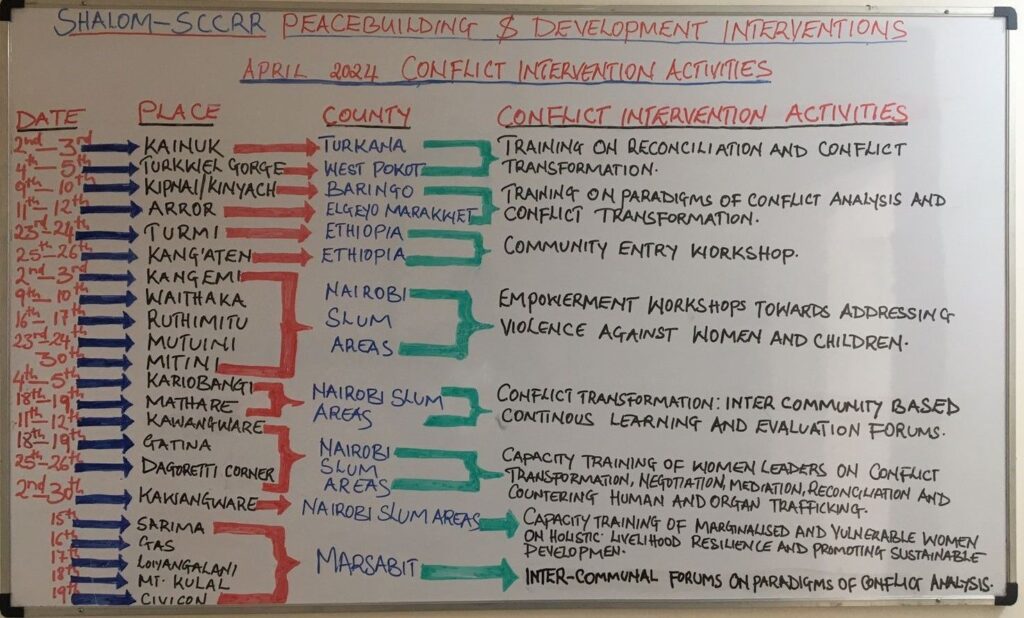Mathare slum is one of the oldest and biggest slums in the Kenya curved and built in a small valley by the Mathare River in Nairobi County. The slum is home to approximately half a million people drawn from different ethnic communities in the country. The complexities of life owing to different ethnic identities and the environment characterized by informal-urban settlements, poverty and underdevelopment has exposed communities living in the area to different challenges including negative ethnicity and stereotyping; political incitement that normally leads to ethnic-based violence (particularly during electioneering periods) and emergence of illegal militia groups that frequently terrorize members of the communities. All these challenges formed the basis for collaboration between Shalom–SCCRR and Caritas-Nairobi with the aim of cultivating and nurturing peace and development in these distressed communities.

Mathare youth engaging the police after the nullification of the 2017 presidential elections
The intervention strategy employed by SCCRR in Mathare involves engaging both the members of the community and young generations in schools. At the community level, key influential stakeholders are engaged in Peace Groups through a series of peace trainings aimed at equipping them with vital knowledge and analytical skills of peacebuilding enabling them to rally their communities in becoming architects of their own peace and development. The trained participants are currently spearheading the drawing and implementation of practical action plans hence contributing in conflict prevention, conflict management, conflict resolution and conflict transformation in their own communities.

Ongoing facilitation with the Peace Patrons
The progressive interventions with the communities in the project areas, also led to Shalom’s further realization that there was need and value in engaging the children in schools in through peace education. Shalom’s Peace Education strategy entails, establishment of inter-ethnic schools in areas entrenched by conflicts, development of schools through provision of learning materials such as books, desks, chairs, solar panels and building materials for classrooms. In addition, SCCRR establishes peace clubs in the targeted schools, conducts peace education trainings with both peace club members and peace clubs’ patrons while guiding in the drawing and implementation of practical peace-related action plans by the peace club members under the leadership of peace patrons. This strategy will go further in instilling positive change in the children’s values, perceptions, attitudes, beliefs and behaviours hence enabling them to live in tranquility with each other regardless of their ethnic identity and background.
In the month of February, SCCRR trained sixteen (16) Peace Club Patrons drawn from eight (8) primary schools in Mathare with a population of 2050 pupils and 410 peace club members. The main objective of the training was to equip these teachers with the relevant knowledge and analytical skills of peacebuilding that will enable them to effectively run peace education trainings and peace clubs in their respective schools. These teachers had basic knowledge and skills of peacebuilding and were, therefore, eager to learn more about peacebuilding strategies. As presented by Mr. Winston Origi, a teacher from WhyNot Academy, the teachers acknowledged that “teaching in our schools is very difficult as entrenched inter-ethnic conflicts has contributed in increased indiscipline cases, low retention of learners, high school drop outs, low turnover of teachers and this has hampered teachers’ morale and productivity.” All these factors have gone further in impacting negatively on the performance of the schools in this area.

A group photo of SCCRR’s Team and the Peace Patrons after the workshop
At the end of the training, the participants accumulated invaluable knowledge and skills that enhanced their competency in the field of peacebuilding. The SCCRR’s team and the teachers agreed on the strategies that the trained teachers were to use in conducting peace education trainings, running of peace clubs and identification of peace and cohesion initiatives that the peace clubs’ members will be engaged in not only at the school level but also at the community level. At the school level, the Peace Clubs members will participate in: intra and inter-schools dramas, debates and peace tournaments; composition of peace songs and poems; having peace pen pals across different schools and sharing of peace ideas and related activities. At the community level, the Peace Club members will be engaged majorly in: home visits among children from different ethnic communities; and, participate in planting of trees and peace walks. These activities are envisaged to influence the learners both from a personal level (perceptual, spiritual and emotional) and relational level (behavioral, stereotypes and communication) hence fostering a culture of peace in children both in primary and secondary schools.
Shalom envisions the end of violence in all slums and tribal lands through peaceful social relations, tolerance, social justice and reconciliation in communities. Peace Education in schools, therefore, not only underpins the vision but also guarantees its actualization in communities living in areas with entrenched inter-ethnic conflicts such as in Mathare.
Author: Esther Kibe, M.A., B.A.; Program Officer (Communications)

